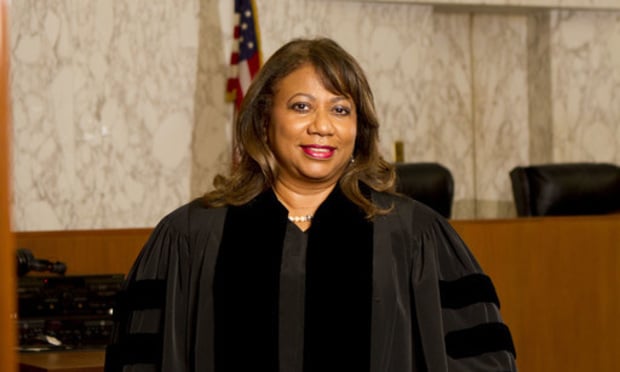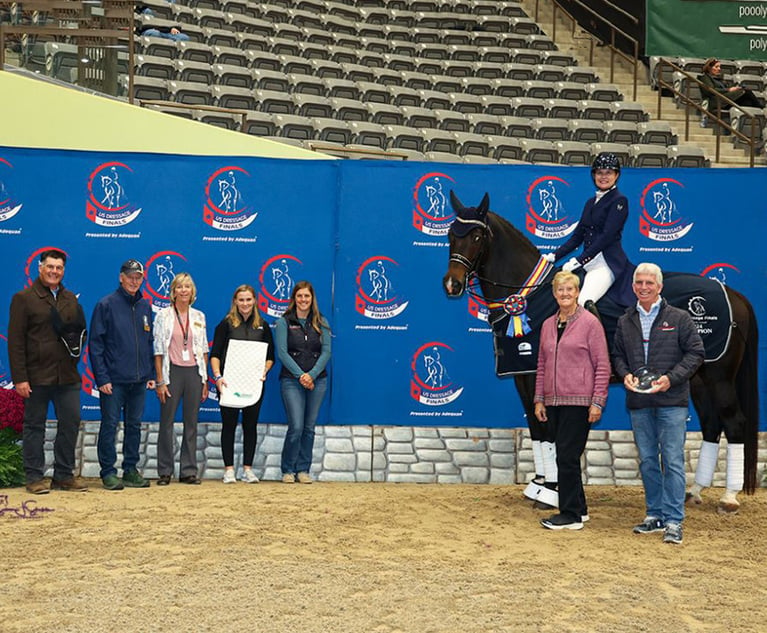Appeals Court: Judge Right to Reseat Black Jurors After Batson Challenge
Although the defense argued the strikes were for other reasons, the court ruled that those reasons were pretextual and not race-neutral.
June 14, 2019 at 03:31 PM
6 minute read
 Presiding Judge M. Yvette Miller, Georgia Court of Appeals (Photo: John Disney/ALM)
Presiding Judge M. Yvette Miller, Georgia Court of Appeals (Photo: John Disney/ALM)
The Georgia Court of Appeals upheld a trial judge's decision to reseat five African American jurors who were struck by the defense in a trial that ultimately delivered nearly $1.3 million to a woman injured in a go-kart wreck at a Roswell track.
After the defense used all of its peremptory strikes against black jurors, the plaintiffs asked the court to decide whether the dismissals were a violation under the U.S. Supreme Court's decision in Batson v. Kentucky, which bars race-based jury selection.
Although the defense argued that the strikes were for other reasons, Fulton County State Court Judge Patsy Porter ruled that, in five of the defense's six peremptory strikes, those reasons were pretextual and not race-neutral.
The defense's sixth strike was not used.
Defense counsel at trial included Barbara Marschalk, Matthew Nanninga and Robert Quinn of Drew Eckl & Farnham. On appeal, they were joined by Robert Marcovitch of Lewis Brisbois Bisgaard & Smith, who declined to comment.
Plaintiffs attorney Lloyd Hoffspiegel said other posttrial issues, including a sanctions motion against the defense and a request for attorney fees, were placed on hold while the appeal was pending.
Hoffspiegel tried the case with his son and Hoffspiegel Law partner, Alex Hoffspiegel, and Mark Link and Ashley Dawkins of Tucker's Link & Smith. For the appeal, they enlisted the aid of Hadden Law Firm principal John Hadden.
As detailed in the appellate ruling and court filings, the case involved a 2014 incident at Andretti Indoor Karting and Games in which plaintiff Tanisha Marshall was injured when she hit an unpadded section of wall after being bumped by another driver.
Marshall sued the track's corporate owner, AIKG LLC, in 2016, and the case went to trial in December 2017.
The trial began with a hiccup when a juror declared on the first day that she could not be impartial. Porter declared a mistrial and held the juror in contempt.
During voir dire for a second jury, Marshall's attorneys raised a Batson challenge, arguing that, of the 25-member jury pool, 15 were white and 10 were black, as is Marshall.
Of those 10, only three made it to the jury.
Noting that all the defense strikes were of African American panelists, Porter directed AIkG's counsel to respond to the Batson challenge.
The defense began by noting it had not used all six of its strikes and still had one left.
A defense lawyer identified as Marschalk in a transcript then discussed the stricken jurors individually.
The first was “a retired gentleman and in my experience I typically do not like retirees, no matter what their background is,” she is quoted as saying. “I find that they, I don't know if it's from daytime television or what, but in my experience retirees have not been particularly good defense jurors.”
The next juror “we didn't learn that much information from,” she said. “The only note that I have written down about [the juror] was that she commented during [Lloyd] Hoffspiegel's voir dire that, when people drive too fast, it can lead to great injuries.”
The third juror also didn't offer much information, “and the only thing I wrote down about her is that she had a pretty visceral reaction to one of the questions during Mr. Hoffspiegel's examination, which she was very, very, very adamant about seat belt usage and seemed to indicate that she thought seat belts would basically prevent any sort of injury,” she said.
The fourth, Marschalk is quoted as saying, “caused me a little bit of concern and that was that, if you don't follow the rules, people get hurt.”
Marshall's counsel had earlier indicated that “this is going to be a safety rules case,” she said.
She said the defense also “didn't learn a lot about” the fifth strike, but one thing she wrote down was “businesses should make sure that people cannot get hurt, and that's a direct quote from the voir dire process.”
Porter allowed Marshall's lawyers to argue why the defense reasons were pretextual, then ruled that those reasons did not satisfy the Batson requirements “based upon the fact that race neutral reasons were not given; based upon the fact that several of the jurors … were asked few, if any questions.”
“Based upon the strikes that the defense made, it was an overwhelming pattern of strikes against African Americans,” Porter said, and “not a lot of meaningful question[s]” were asked of the dismissed jurors.
She reseated the stricken jurors, and the case went to trial.
The jury delivered a post-apportioned award of $1.28 million after a two-day trial.
AIKG appealed Porter's Batson ruling, and on June 12 the Court of Appeals affirmed.
The opinion, written by Presiding Judge Yvette Miller with the concurrence of Judges Clyde Reese and Elizabeth Gobeil, said there are three prongs to sustaining a Batson challenge: The challenger must make a prima facie showing of racial discrimination; the challenged party must then provide a race-neutral explanation; then the court decides whether the challenger has proven a discriminatory intent.
Porter's ruling followed all three steps, Miller wrote.
“Given that all of the stricken jurors were African-American, as well as the trial court's finding of AIkG's admission that it did not 'glean' information from several of the jurors [and] the disparate lack of questioning of the stricken jurors … the trial court did not clearly err in finding purposeful discrimination in AIKG's use of its peremptory strikes,” Miller said.
While Marshall's lawyers welcomed the ruling, they noted that there are still other unresolved issues.
In addition to the pending sanctions motion, AIKG's excess insurance carrier has filed a declaratory judgment action in federal court in Atlanta seeking to avoid its portion of the judgment and any additional sums that may accrue if the sanctions bid is successful.
This content has been archived. It is available through our partners, LexisNexis® and Bloomberg Law.
To view this content, please continue to their sites.
Not a Lexis Subscriber?
Subscribe Now
Not a Bloomberg Law Subscriber?
Subscribe Now
NOT FOR REPRINT
© 2025 ALM Global, LLC, All Rights Reserved. Request academic re-use from www.copyright.com. All other uses, submit a request to [email protected]. For more information visit Asset & Logo Licensing.
You Might Like
View All


'It Refreshes Me': King & Spalding Privacy Leader Doubles as Equestrian Champ
5 minute read
Federal Judge Rejects Teams' Challenge to NASCAR's 'Anticompetitive Terms' in Agreement
Trending Stories
- 1States Accuse Trump of Thwarting Court's Funding Restoration Order
- 2Microsoft Becomes Latest Tech Company to Face Claims of Stealing Marketing Commissions From Influencers
- 3Coral Gables Attorney Busted for Stalking Lawyer
- 4Trump's DOJ Delays Releasing Jan. 6 FBI Agents List Under Consent Order
- 5Securities Report Says That 2024 Settlements Passed a Total of $5.2B
Who Got The Work
J. Brugh Lower of Gibbons has entered an appearance for industrial equipment supplier Devco Corporation in a pending trademark infringement lawsuit. The suit, accusing the defendant of selling knock-off Graco products, was filed Dec. 18 in New Jersey District Court by Rivkin Radler on behalf of Graco Inc. and Graco Minnesota. The case, assigned to U.S. District Judge Zahid N. Quraishi, is 3:24-cv-11294, Graco Inc. et al v. Devco Corporation.
Who Got The Work
Rebecca Maller-Stein and Kent A. Yalowitz of Arnold & Porter Kaye Scholer have entered their appearances for Hanaco Venture Capital and its executives, Lior Prosor and David Frankel, in a pending securities lawsuit. The action, filed on Dec. 24 in New York Southern District Court by Zell, Aron & Co. on behalf of Goldeneye Advisors, accuses the defendants of negligently and fraudulently managing the plaintiff's $1 million investment. The case, assigned to U.S. District Judge Vernon S. Broderick, is 1:24-cv-09918, Goldeneye Advisors, LLC v. Hanaco Venture Capital, Ltd. et al.
Who Got The Work
Attorneys from A&O Shearman has stepped in as defense counsel for Toronto-Dominion Bank and other defendants in a pending securities class action. The suit, filed Dec. 11 in New York Southern District Court by Bleichmar Fonti & Auld, accuses the defendants of concealing the bank's 'pervasive' deficiencies in regards to its compliance with the Bank Secrecy Act and the quality of its anti-money laundering controls. The case, assigned to U.S. District Judge Arun Subramanian, is 1:24-cv-09445, Gonzalez v. The Toronto-Dominion Bank et al.
Who Got The Work
Crown Castle International, a Pennsylvania company providing shared communications infrastructure, has turned to Luke D. Wolf of Gordon Rees Scully Mansukhani to fend off a pending breach-of-contract lawsuit. The court action, filed Nov. 25 in Michigan Eastern District Court by Hooper Hathaway PC on behalf of The Town Residences LLC, accuses Crown Castle of failing to transfer approximately $30,000 in utility payments from T-Mobile in breach of a roof-top lease and assignment agreement. The case, assigned to U.S. District Judge Susan K. Declercq, is 2:24-cv-13131, The Town Residences LLC v. T-Mobile US, Inc. et al.
Who Got The Work
Wilfred P. Coronato and Daniel M. Schwartz of McCarter & English have stepped in as defense counsel to Electrolux Home Products Inc. in a pending product liability lawsuit. The court action, filed Nov. 26 in New York Eastern District Court by Poulos Lopiccolo PC and Nagel Rice LLP on behalf of David Stern, alleges that the defendant's refrigerators’ drawers and shelving repeatedly break and fall apart within months after purchase. The case, assigned to U.S. District Judge Joan M. Azrack, is 2:24-cv-08204, Stern v. Electrolux Home Products, Inc.
Featured Firms
Law Offices of Gary Martin Hays & Associates, P.C.
(470) 294-1674
Law Offices of Mark E. Salomone
(857) 444-6468
Smith & Hassler
(713) 739-1250






